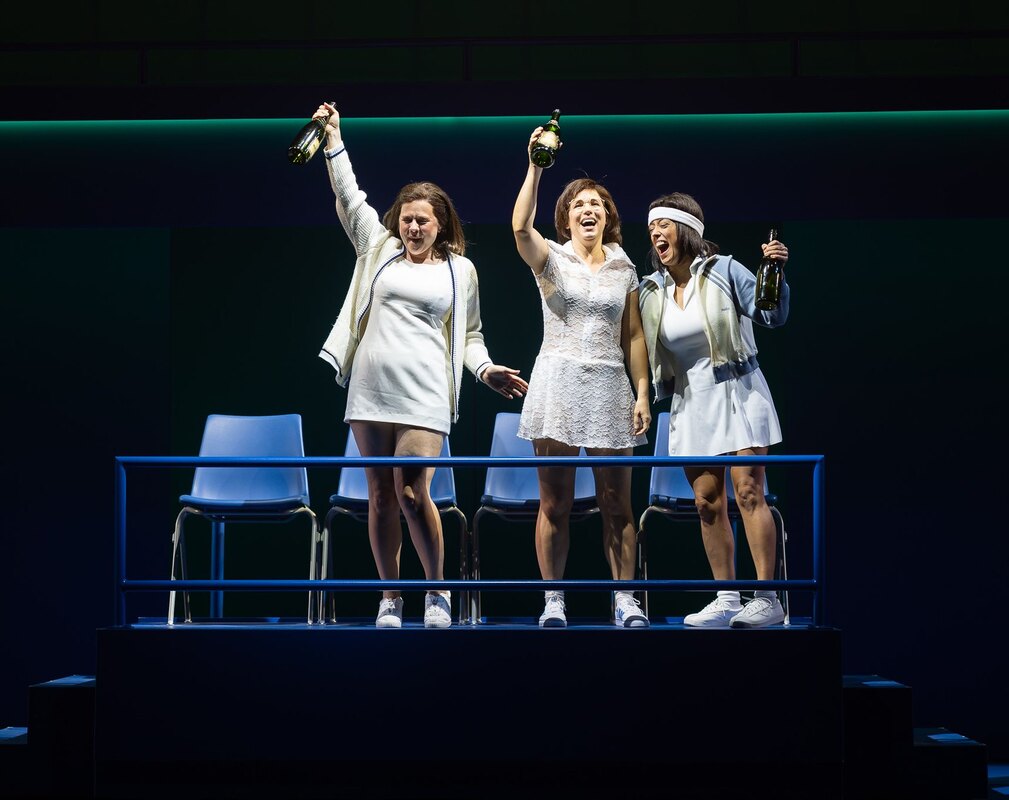|
Chilina Kennedy, center, stars as Billie Jean King in "Love All." Photo by Rich Soublet Growing up, the first female athlete I became aware of was Billie Jean King. As the years went by, I came to admire and respect her for much more than her dominance on the tennis court. She was and is a woman of courage, conviction and flat out guts.
So what a thrill to see her in person at La Jolla Playhouse on opening night of “Love All,” the world-premiere play by Anna Deavere Smith based on the 79-year-old King’s extraordinary life. When she was introduced from in front of the stage before the show by Playhouse Artistic Director Christopher Ashley, the audience gave her a loud standing ovation. Standing o’s are rife at most theater productions in town AFTER the performance, but this was the first time I’d ever seen one (or been part of one) before the performance even began. It’s a shame that this was the highlight of the evening. “Love All” looks and sounds like one of those television docudramas of a famous person’s life. King’s passions – for tennis, for fair pay for and equal treatment of woman athletes, for social justice, for the man (and women) she loved – feel overly scripted, hurried, expressed in bromides that I found surprising coming from the pen of the deservedly respected Anna Deavere Smith. King’s story, from childhood into the early 1970s, is dramatized in short mini-scenes directed as if for economy of time by Marc Bruni. (It’s a strange dynamic given that the play overall feels too long.) The while, projections above the stage (by S. Katy Tucker) chronicle the socio-political turmoil that paralleled King’s rise to tennis heights and her championing of critical causes. There’s the JFK assassination, the killing of Dr. Martin Luther King, the prelude to the assassination of Robert Kennedy, the Vietnam War. There’s Muhammad Ali explaining his refusal to kill in Vietnam. There’s the war itself. There’s Kent State. It’s a newsreel that at times overshadows the personal dramas of Billie Jean King being portrayed onstage, such as her relationship with husband Larry King and her exploration of her sexuality. The trip through history, onstage and on the screen, is tiring. A rewritten “Love All” might focus on any of several significant aspects of King’s life rather than trying to Tell It All. Throughout the play and at different ages, the role of King is entrusted to Chilina Kennedy, who is very righteous and quite good. Much as King’s doubles partner and friend Rosie Casals was the brash yin to King’s more serious yang, Elena Hurst, making her Playhouse debut, is just as strident for the cause but a lot more fun. She’s the kind of pal everyone would like to have. As King’s business-minded spouse Larry, John Kroft never seemed dynamic enough for me, while Nancy Lemenager as King’s manager Gladys Heldman, Bianca Amato as young Billie Jean’s coach/mentor Alice Marble and Ben Jacoby as men’s tennis icon Jack Kramer all border on caricaturization. One scene in the second act, which finds a soul-searching King at a retreat, is just silly, complete with misfired Bob Dylan/acid bartender joke. It also serves to weaken what ensues – a telling reunion between King and the “rock star” hairdresser she’d encountered earlier. What “Love All” gets right is its portrayal of the prejudice that Black tennis champion Althea Gibson was subject to – King’s outraged discovery of Gibson having to play a maid in a John Wayne western is one of the production’s few urgent moments – and of otherwise-revered icon Arthur Ashe’s dismissal of women players’ demand for equal pay. There is a lot of tennis history in “Love All,” and it certainly helps to be familiar with it. (King had significant involvement in the crafting of this script.) I find it engrossing, but non-buffs may not. Surprisingly, “Love All” references but does not revisit or act out the famous King vs. Bobby Riggs “Battle of the Sexes.” Instead, it ends with the dedication of the USTA Billie Jean King National Tennis Center, home of the U.S. Open Championship. Then actors, including Amato as King’s wife Ilana Kloss, break character and address the audience as though wrapping up the docudrama. Not ideal. Billie Jean King is worthy of many epic tellings of her life, such an important American figure has she been and still is. “Love All,” at least right now, is not worthy of her. “Love All” runs through July 2 at La Jolla Playhouse’s Mandell Weiss Theatre.
0 Comments
Leave a Reply. |
AuthorDavid L. Coddon is a Southern California theater critic. Archives
July 2024
Categories |
David Coddon |
|
